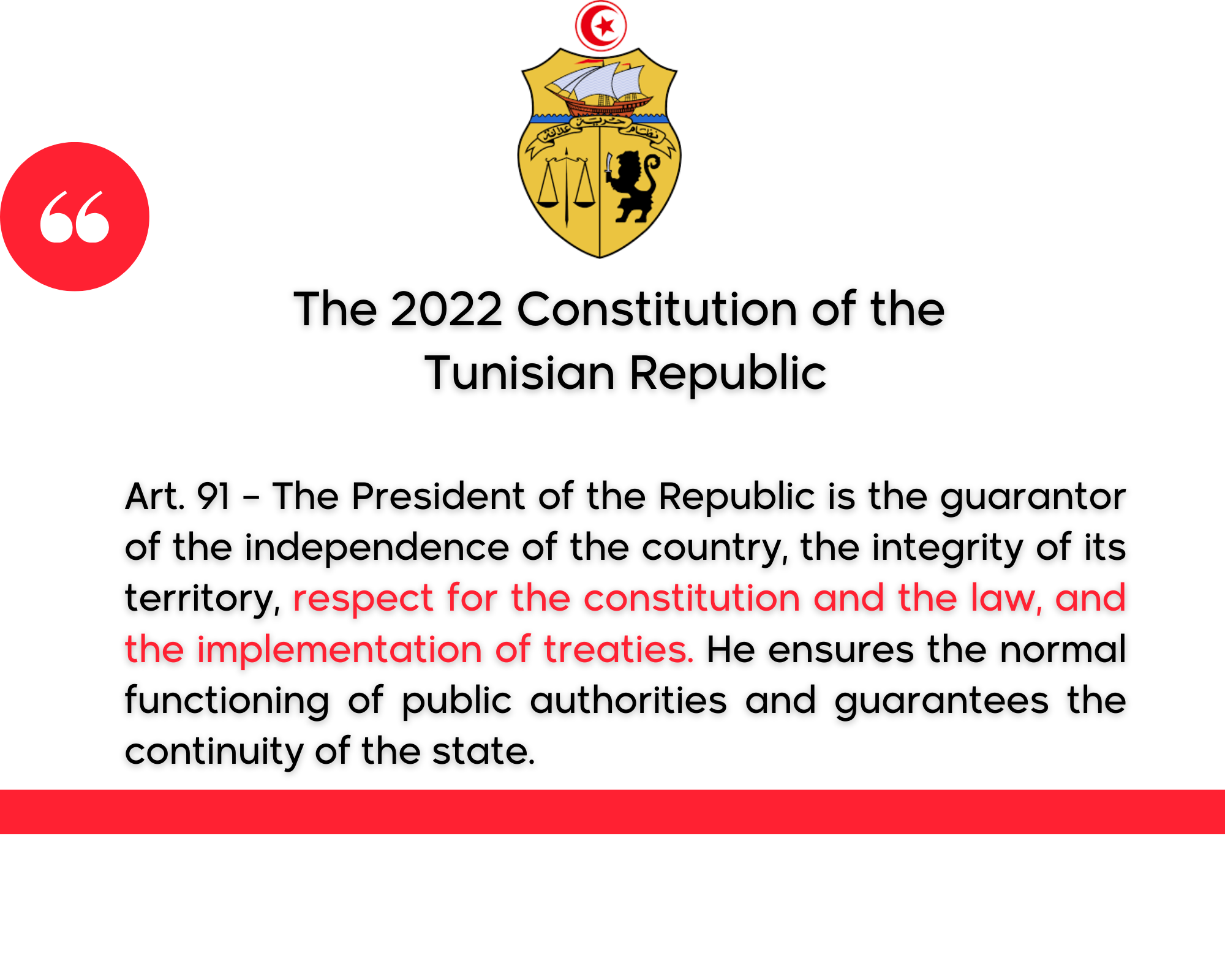Tunisia: Adala for All association calls on the state to comply with the decision of the African Court of Human and Peoples’ Rights of suspending Presidential Decree No. 35 of 2022
After reviewing the African Court of Human and Peoples’ Rights urgent means decision issued on 3 October 2024 (1) within the framework of Case No. 8 of 2024, at the request of a group of judges whose rights to fair trials were violated, the African’s Court’s decision demanded the Tunisian state suspend the implementation of Presidential Decree No. 35 of 2022. Presidential Decree No. 35 of 2022 granted the President of the Republic Kais Saied the authority to dismiss any judge without any prior disciplinary proceedings and suspend Presidential Decree No. 516 of 2022, under which the president dismissed 57 judges pursuant to said decree.
Following the expiration of the two-week deadline granted without the Tunisian state respecting its legal obligation, Adala for All demands that the Tunisian authorities respect their constitutional and international obligations and comply with the decision of the African Court of Human and Peoples’ Rights to suspend the implementation of the aforementioned decrees violating the principles of the rule of law and the independence of the judiciary.
The Tunisian judiciary is witnessing a grave situation, following the President of the Republic, Kais Saied, taking measures to gain complete control over the powers of the Judicial Council, with Presidential Decree No. 35 of 2022. Adala for All (AFA) affirms that the texts of this decree, which included the dissolution of the High Judicial Council on 12 February 2022 and the dismissal of 57 judges on 1 June 2022, represent a violation of the principle of the independence of the judiciary.
The Tunisian judiciary is further facing violations, as the implementation of national-level judicial rulings issued by the Administrative Court in favor of 49 of the aforementioned judges were ignored, and the freezing of the Provisional High Judicial Council’s activity by not replacing the vacancy in its structure for a year. This led to paralysis of the High Judicial Council and granted the Ministry of Justice the opportunity to directly control career paths of judges.
Adala for All further emphasizes that the Ministry of Justice took advantage of this vacuum to carry out transfers, promotions, appointments, and stripping of judicial positions through memoranda of action issued by the Minister of Justice, without any legal framework allowing this, according to criteria of loyalty and directing instructions without transparency and integrity. Investigation reports further indicated that these memoranda were intensively activated throughout the judicial year 2023-2024 and even during the judiciary summer vacation, targeting judges who dealt with sensitive files involving political and human rights activists and presidential election candidates.
AFA reaffirms its position on the principles of the rule of law in Tunisia, including the separation of the executive, legislative, and judicial powers and respect for the structural and individual independence of the judiciary.
The African Court of Human and Peoples’ Rights issued an urgent means decision within the framework of the Case No. 8 of 2024, dated 03 October 2024 at the request of a group of judges who faced arbitrary dismissal and judges facing intimidation and all forms of pressure in what should be fair trials. The African Court’s decision demanded the Tunisian state suspend the implementation of Presidential Decree No. 35 of 2022, which granted the President of the Republic the power to dismiss any judge without any prior disciplinary proceedings.
The African Court decision further demanded the suspension of Presidential Decree No. 516 of 2022, published in the same official gazette, under which the President of the Republic dismissed 57 judges pursuant to said decree. Although the African Court on Human and Peoples’ Rights has not yet ruled on the merits of the case, its urgent decision reflects the seriousness of the situation that threatens the independence of the judiciary.
The Court gave the Tunisian state two weeks to comply, but the latter has not yet responded to its constitutional and international obligations.
African Charter On Human and Peoples’ Rights
Chapter 1-Human and Peoples’ Rights
Art.1-
The Member States of thr Organisation of African Unity parties to the present Charter shall recognize the rights, duties and freedoms enshirined in the Charter and shall undertake to adopt legislative or other measures to give effect to them.
Based on these developments, Adala for All Association affirms the following ➡️
1️⃣ To fully support the independence of the judiciary in Tunisia, whether at the structural, institutional, or individual level, and continue to support judges facing arbitrary dismissal ;
2️⃣ Calls on the Tunisian state to respect its constitutional and international obligations and to comply with the decision of the African Court of Human and Peoples’ Rights to suspend the implementation of texts violating the principles of the rule of law and the independence of the judiciary ;
3️⃣ The necessity to respect defense guarantees and the principles of fair trial, while emphasizing that the application of the African Court of Human and Peoples’ Rights decision does not contradict the accountability of judges, provided that legal and fair conditions are met ;
4️⃣ Valuing the role of the African Court on Human and Peoples’ Rights as an effective international mechanism to address human rights violations ;
5️⃣ Commitment to continue supporting the plaintiffs in Case No. 08 of 2024 and all efforts aimed at reforming the judiciary and guaranteeing its independence in Tunisia.
◣
1. Tunisia ratified the Protocol guaranteeing individuals and non-governmental organizations the right to access the African Court on Human and Peoples’ Rights in 2017.
The African Court on Human and Peoples’ Rights (ACHPR) was established within the structure of the African Union, to serve as the main judicial body on human rights on the continent. Arusha, Tanzania, was chosen as the seat of the Court, which became operational in November 2006 and is tasked with guaranteeing that member states respect their obligations under the African Charter on Human and Peoples’ Rights. The Court works in cooperation with the African Commission on Human and Peoples’ Rights.
All States Parties to the Protocol establishing the Court recognize the jurisdiction of the Court to hear cases against them, provided the cases relate to alleged violations of the rights contained in the African Charter on Human and Peoples’ Rights and any other human rights instruments ratified by the State concerned. The proceedings before the Court may be further filed to the African Commission on Human and Peoples’ Rights, by a member state, or by an African governmental organization. Article 34(6) of the Protocol provides for the possibility for member states to deposit a declaration allowing individuals to further bring proceedings directly before the Court, after national remedies have been exhausted.



